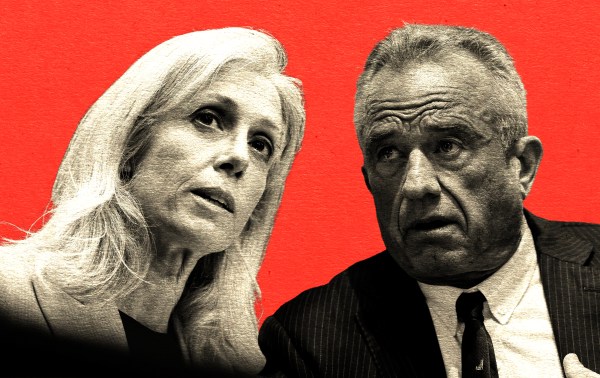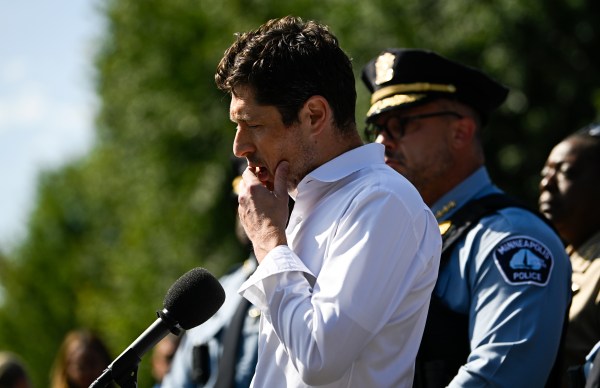You may be surprised to learn that one of the year’s most conservative films is a heart-warming father-son road trip adventure featuring legendary actor (and Biden campaign surrogate) Robert De Niro, alongside The View’s Whoopi Goldberg and late-night TV’s Jimmy Kimmel. Yes, you read that right.
Ezra tells the story of Max Bernal (Bobby Cannavale at his best), a blue-collar stand-up comedian from Hoboken, New Jersey, who fights to protect his 12-year-old son, Ezra (the brilliant newcomer William A. Fitzgerald), who has autism, from a labyrinthine bureaucracy and pharma-peddling doctors. The boy lives with his more refined mom, Jenna (Rose Byrne) and her affluent new beau, Bruce (Tony Goldwyn, who also directed the film). Max, for his part, has moved back in with his own father (De Niro delivering an understated yet strong performance), a former Manhattan chef turned doorman who wishes his middle-aged son would find his way.
As Ezra struggles with everyday life, Max takes him to comedy clubs for good luck, much to the annoyance of his ex-wife. One night, after misinterpreting a comment Bruce made in jest as a threat against the admittedly short-tempered Max, Ezra sneaks out of his second-floor window to warn his dad. As he’s running down the sidewalk, the pre-teen is frightened by a dog and accidentally runs into an oncoming car. Though he avoids serious injury, the collision plunges him into a spiral of medical and psychological evaluations.
A team of medical professionals and caseworkers—who incorrectly believe that Ezra deliberately tried to harm himself—insist on heavily medicating the child, placing him under state custody, and reassigning him to a special needs school. Their mandates and prescriptions are met with little resistance from Jenna and Bruce, but Max is having none of it.
Max isn’t necessarily wrong, but his opinions seem to carry little weight with Jenna and Bruce, who trust the advice of urbane experts over the views of someone they think is a mess. Their assessment of him is not entirely unfounded, and no one would argue that Max is qualified to analyze Ezra’s CT scans. But the boy’s treatment plan hinges on the experts’ mistaken assumption that the boy is a danger to himself. This is a judgment call about Ezra’s behavior—an area that Max, as a parent, is intimately more familiar with than the doctors and social workers who just met the child.
While I typically resist viewing cinema through a political lens, the film’s ethos—specifically how it valorizes the wisdom of ordinary people over technical expertise—is unmistakably conservative. Max did not need a fancy degree to intuitively sense that there was something profoundly wrong with the doctors’ recommendations; he could see it in his boy’s face.
Determined to protect his only child, Max takes Ezra from his mother’s home in the dead of night, leaves a note behind, and heads to a friend’s house a day’s drive away to figure things out. Along the way, he learns from his agent (Goldberg) that Kimmel saw a recording of his routine and wants to invite him on his show. Now the pair must travel cross-country to Los Angeles.
During their road trip, Max uses his comedic charm and practical know-how to help Ezra emerge from his shell. The word “autism”—derived from the Greek word “autos,” meaning “self”—originally described a person retreating into their own inner world. Yet in many ways, it’s not just Ezra who is withdrawn, but Max as well (and, by extension, all of us). The pair’s chemistry and Max’s love for his son ennoble the audience by shining a light on the challenges and blessings experienced by the families of the 1 in 36 children in the U.S. with autism.
Ezra’s condition adds another layer of depth to the narrative, emphasizing that all children—not just those with unique abilities—have special needs that demand customized care, which rigid, one-size-fits-all bureaucracies cannot accommodate. Alas, as the film makes clear, while the state can assist, it is ultimately parents who are indispensable in providing their children with personalized attention.
Though its themes are universal, conservatives will especially appreciate the film’s uplifting portrayal of fathers, its exploration of parental rights, and the wisdom of plain-spoken people. In many ways, Ezra can be seen as an ode to William F. Buckley Jr.'s famous preference for being “governed by the first 2,000 people in the Boston telephone directory than by the 2,000 people on the faculty of Harvard University.”
Aside from its conservative sensibility, what truly sets the film apart is its authenticity and nuance. Fitzgerald, who is on the autism spectrum himself, perfectly captures the title character's innocence, frustration, and growth. Meanwhile, Goldwyn’s delicate direction ensures that audiences walk away believing Max is a good dad, even with his flaws. The public school system and medical professionals are not malicious, just mistaken. Jenna and Bruce may be overly trusting of experts, but they’re genuinely trying their best under difficult circumstances. This is a movie that likes its characters and lets them shine without reducing them to caricatures.
Ezra is particularly relevant as many parents continue to see their children struggle academically and socially in the aftermath of COVID-era school closures and lockdowns. Indeed, we would be better off today if more mothers and fathers had been as proactive and willing as Max to push back against the diktats of so-called experts. However, like many of the film’s supporting characters, most parents simply did what they could with limited information. This parallel makes the film all the more timely, encouraging a balance of healthy skepticism toward authorities and compassion for families navigating unprecedented challenges.
Despite its relevance and a 92 percent audience score on Rotten Tomatoes, the film has grossed just $2.5 million since its May 31 release. Movies can underperform for many reasons (e.g., challenging themes, marketing misfires, etc.), and the box office has been less than stellar this year. Yet, I can’t help but wonder if Robert De Niro's now infamous attack on Donald Trump outside of the Lower Manhattan courthouse at the behest of Joe Biden’s campaign contributed to its lackluster performance. If so, perhaps when the electoral passions of 2024 subside, Ezra will rightly emerge as a celebration of the wisdom of ordinary people, particularly fathers, and a reminder that learned experts and government officials often get it wrong.
Ezra transcends political and neurodiverse spectrums while underscoring the irreplaceable role fathers play in society and our lives. This makes it far more significant than the controversy du jour and an ideal choice for Father’s Day viewing—if you can still find it in theaters.






Please note that we at The Dispatch hold ourselves, our work, and our commenters to a higher standard than other places on the internet. We welcome comments that foster genuine debate or discussion—including comments critical of us or our work—but responses that include ad hominem attacks on fellow Dispatch members or are intended to stoke fear and anger may be moderated.
With your membership, you only have the ability to comment on The Morning Dispatch articles. Consider upgrading to join the conversation everywhere.